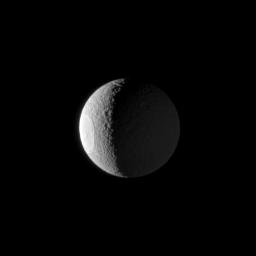
|
Not-So-Dark Side of Tethys
- Click the image above for a larger view
- Full-Res JPEG (573 x 573) (8.8 kB)
- Full-Res TIFF (573 x 573) (328.9 kB)
Caption:
The huge Odysseus Crater is clearly illuminated by the sun on the western limb of Tethys, but Saturn shining from the right makes the smaller craters on the eastern part of the moon also visible.
The ancient Odysseus Crater is 450 kilometers, or 280 miles, across and covers a sizable chunk of the moon. North on Tethys (1062 kilometers, or 660 miles across) is up and rotated 31 degrees to the left. This view looks toward the Saturn-facing side of the moon.
The image was taken in visible light with the Cassini spacecraft narrow-angle camera on Jan. 22, 2009. The view was acquired at a distance of approximately 793,000 kilometers (493,000 miles) from Tethys and at a Sun-Tethys-spacecraft, or phase, angle of 112 degrees. Image scale is 5 kilometers (3 miles) per pixel.
Background Info:
The Cassini-Huygens mission is a cooperative project of NASA, the European Space Agency and the Italian Space Agency. The Jet Propulsion Laboratory, a division of the California Institute of Technology in Pasadena, manages the mission for NASA's Science Mission Directorate, Washington, D.C. The Cassini orbiter and its two onboard cameras were designed, developed and assembled at JPL. The imaging operations center is based at the Space Science Institute in Boulder, Colo.>
For more information about the Cassini-Huygens mission visit http://saturn.jpl.nasa.gov/ . The Cassini imaging team homepage is at http://ciclops.org .
Cataloging Keywords:
| Name | Value | Additional Values |
|---|---|---|
| Target | Tethys | Saturn |
| System | Saturn | |
| Target Type | Satellite | Planet |
| Mission | Cassini-Huygens | |
| Instrument Host | Cassini Orbiter | |
| Host Type | Orbiter | |
| Instrument | Imaging Science Subsystem (ISS) | |
| Detector | Narrow Angle Camera | |
| Extra Keywords | Crater, Grayscale, Rotation, Visual | |
| Acquisition Date | ||
| Release Date | 2009-03-12 | |
| Date in Caption | 2009-01-22 | |
| Image Credit | NASA/JPL/Space Science Institute | |
| Source | photojournal.jpl.nasa.gov/catalog/PIA10597 | |
| Identifier | PIA10597 | |
